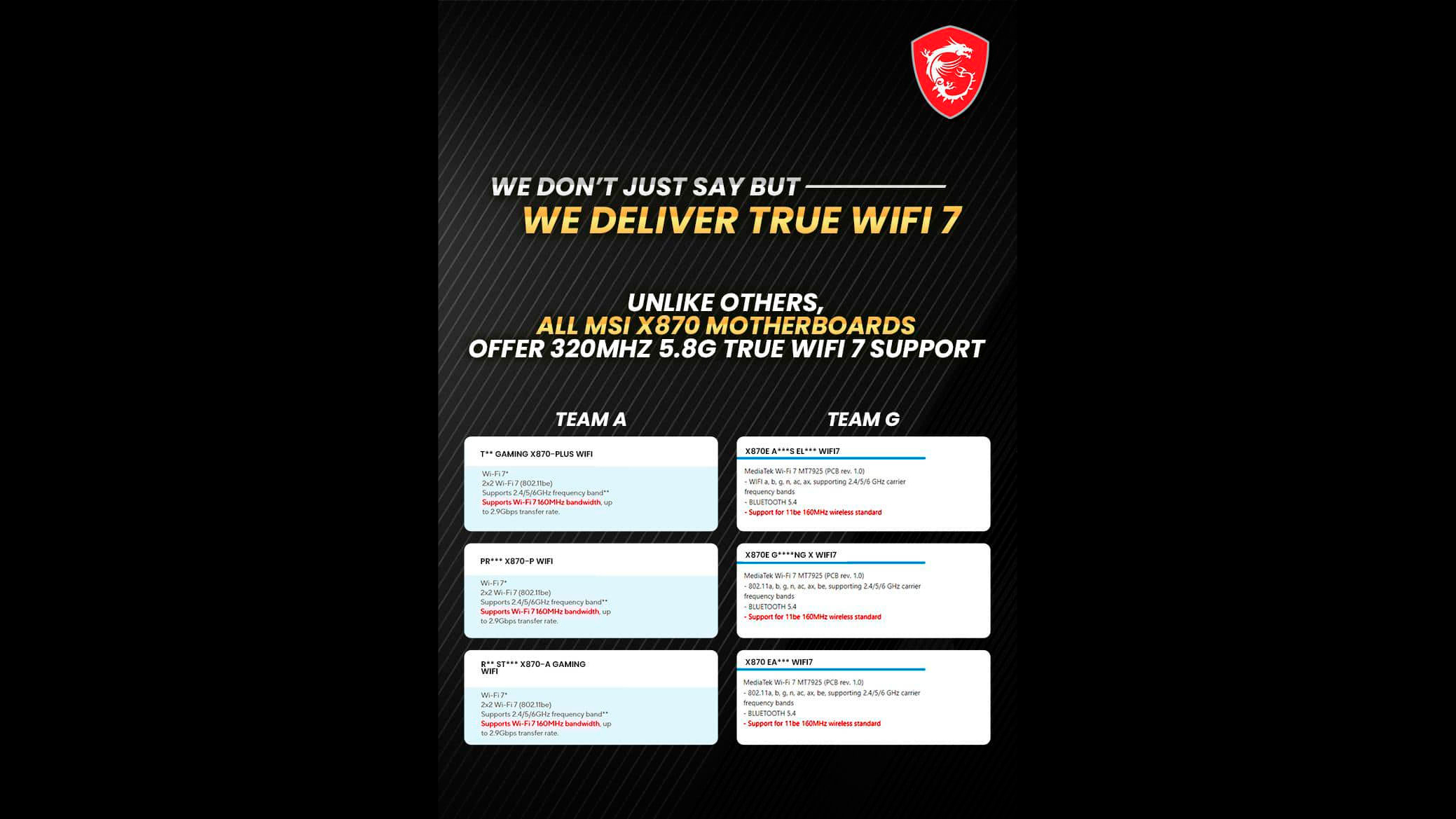MSI touts "true" Wi-Fi 7 support on X870 motherboards over the competition — MSI supports 320 MHz channel, while rivals are limited to 160 MHz
Using 160 MHz channels results in speeds effectively equivalent to Wi-Fi 6.

MSIYesterday, a Twitter post (via Uniko's Hardware) spread in tech circles highlighting how MSI's marketing material advertising "true" Wi-Fi 7 support using 320 MHz modules compared to Wi-Fi 7 support using 160 MHz modules. For the uninformed, this might seem like a minor difference or even an exaggeration for marketing's sake on the part of MSI or the other companies participating in this marketing, but it actually...isn't.
If anything, this may be a necessary advertising push to teach end users the difference between Wi-Fi 7 in name only and actual Wi-Fi 7 hardware. The issue with Wi-Fi 7 using 160 MHz modules is that this effectively locks them to the maximum speed of already-existing Wi-Fi 6E networks, which also operate using 160 MHz. While both Wi-Fi 6E and Wi-Fi 7 can utilize 6 GHz Wi-Fi, you won't achieve the two times-plus rated performance improvements of Wi-Fi 7 without client and host devices operating at 6 GHz and using 320 MHz modules.
As highlighted in the original thread, there's a lot of stick-waving between MSI, Team A (Asus), and Team G (Gigabyte). MSI boasts up to 5.8 gigabits with its Wi-Fi 7 modules, while Asus boasts up to 6.5 gigabits. Gigabyte, also mentioned in the thread, does not have 320 MHz Wi-Fi 7 support but does leverage features like dual 40 Gigabit USB4 ports.
Depending on the demands of your wireless network and what speeds you can realistically achieve with your Internet Service Provider, features like these may be prioritized over 360 MHz Wi-Fi 7 support—but MSI is right to flaunt its superiority in this regard.
In parallel, as the thread highlights, Intel and Realtek, who will most likely provide most entry-level Wi-Fi 7 hardware due to their place in the industry, still seem stuck on 160 MHz. Intel and Realtek Wi-Fi 7 modules still use 160 MHz and thus are limited to roughly 2.8 gigabits, which is in line with the maximum throughput of Wi-Fi 6E if not slightly stabilized due to the updated standard.
Hopefully, with time, proper support for full-throttle 320 MHz Wi-Fi 7 will improve. It's at least expected that Wi-Fi 6E devices will still perform better with Wi-Fi 7 routers than they would otherwise, and realistically, most home Internet connections simply aren't tapping out Wi-Fi 6E's full potential, especially not Wi-Fi 7's. Even so, one could easily understand how a user may feel deceived by paying for a motherboard that only supports 160 MHz Wi-Fi 7 when they wanted 320 MHz Wi-Fi 7— and thus, why MSI is insistent on flaunting "true Wi-Fi 7" capabilities.
Get Tom's Hardware's best news and in-depth reviews, straight to your inbox.

Christopher Harper has been a successful freelance tech writer specializing in PC hardware and gaming since 2015, and ghostwrote for various B2B clients in High School before that. Outside of work, Christopher is best known to friends and rivals as an active competitive player in various eSports (particularly fighting games and arena shooters) and a purveyor of music ranging from Jimi Hendrix to Killer Mike to the Sonic Adventure 2 soundtrack.
-
AkroZ Firstly it seems that supported bandwith for Wifi 7 are contiguous and non-contiguous 320/160+160 MHz and 240/160+80 MHz bandwidth.Reply
I have checked different constructors (like Gygabyte and Intel) and they all indicates in their datasheet supporting 320Mhz of bandwidth but pending the next Windows 11 update.
It's the same informations on MSI motherboards.
Some forum users were speaking of being limited to 160 Mhz and were thinking that it was a driver issue.
It's deceiving that MSI use those kinds of sales tricks. -
kiniku A whole slew of new motherboards for people that aren't interested in their newest CPU generation.Reply -
Pierce2623 Well I live an area where I literally can’t get better than 500Mbps down and 200Mbps up….I think I’ll be safe a while longer on my WiFi 6e router lol.Reply